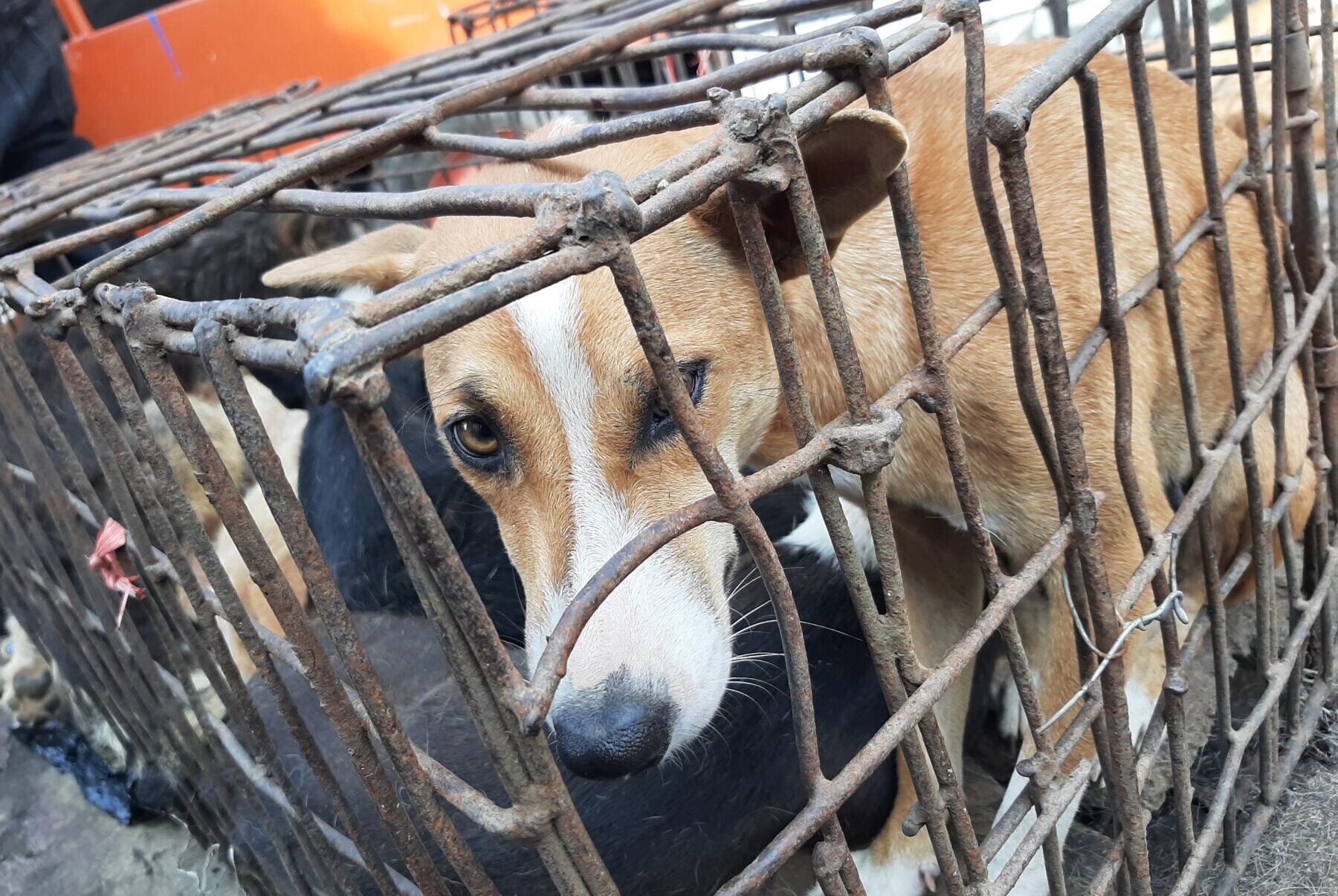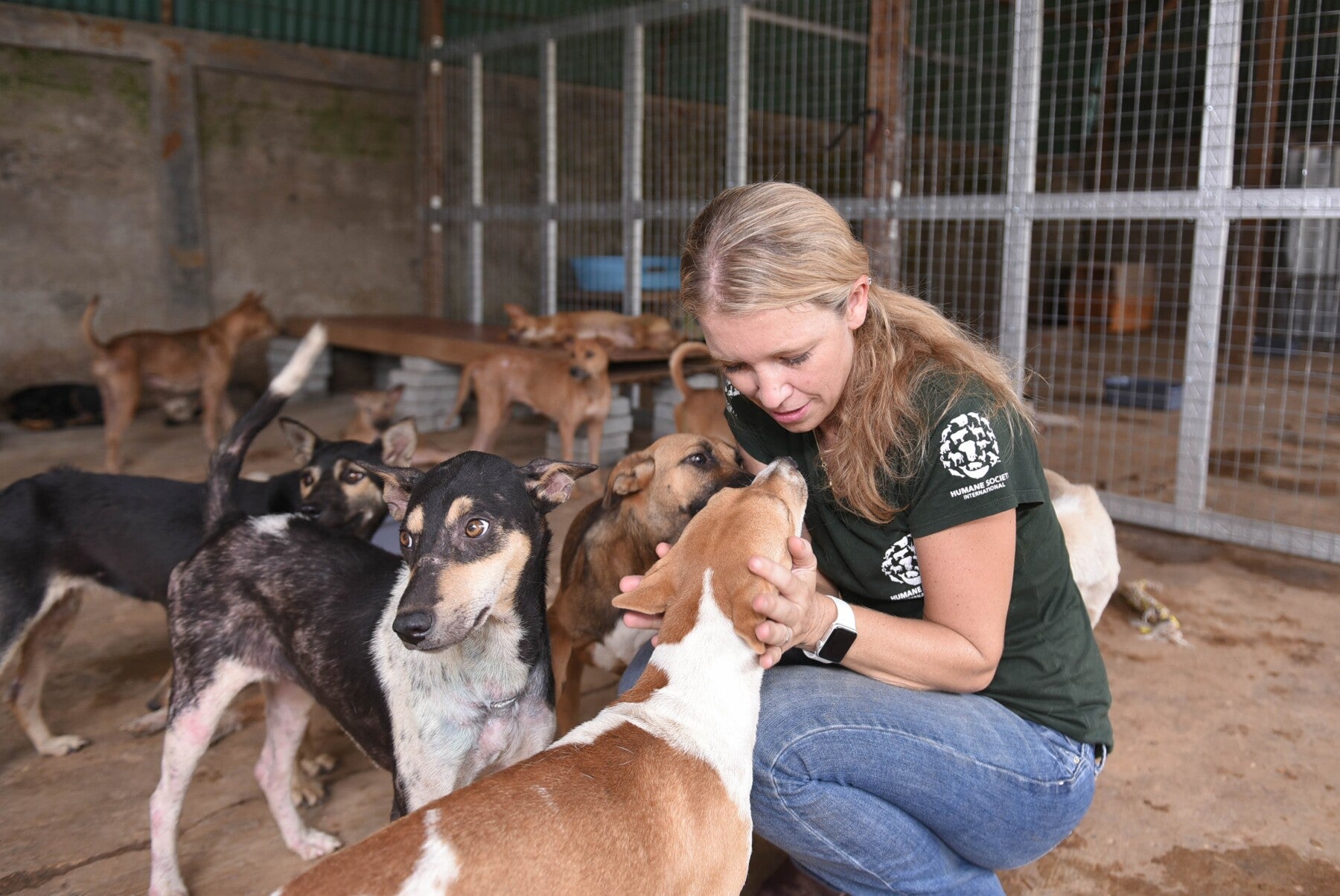
The dog and cat meat trade in Indonesia
Every year, millions of dogs and cats are captured and transported across Indonesia for the brutal dog and cat meat trade. Many are stolen family pets or strays snatched from city streets and rural areas. These animals are crammed into cages or sacks so tightly they can’t move, often with their mouths bound shut, barely able to breathe. Enduring excruciatingly long journeys on bikes or overcrowded trucks, they are taken to markets, slaughterhouses, and restaurants. Some die from suffocation, dehydration, or heatstroke before reaching their destination. For those who survive, their fate is even more horrific forced to witness others being killed before their own agonizing death. The terror and suffering they endure is unimaginable.
Donate now to help stop this cruel trade and protect all animals.
Dog Meat Free Indonesia (DMFI) coalition
HSI is a founding member of the Dog Meat Free Indonesia (DMFI) coalition, working alongside international and national organizations to end the dog and cat meat trade in Indonesia. The coalition works to expose the cruelty, raise awareness and push for legal reforms to stop the trade, protect animal welfare and prevent associated public health risks such as the spread of rabies.
A human health risk
DMFI investigations have exposed the severe animal cruelty and the significant threat to human health. The dog meat trade involves the mass movement of dogs of unknown disease status between provinces and islands. The World Health Organization (WHO) has highlighted this trade as a major contributor to the spread of rabies in Indonesia. By moving rabies-positive dogs into densely populated areas, such as Jakarta, which has worked hard to achieve a rabies-free status, the trade undermines rabies control efforts across the country.
Unsanitary conditions at slaughterhouses and markets add another layer of concern. Traders, slaughterers, vendors and consumers are exposed to rabies and other zoonotic diseases. Evidence shows that rabies-positive dogs are being sold and slaughtered for consumption, particularly in North Sulawesi’s infamous traditional markets, where dogs and cats are sold alongside other animals such as chickens and wildlife.
In addition, when vaccinated dogs are taken from their communities for the dog meat trade, this reduces the overall number of immune dogs, lowering the population’s herd immunity. As a result, rabies can spread more easily among the remaining unvaccinated or partially vaccinated dogs in the community.
While only an estimated 4.5% of Indonesia’s population consumes dog meat, the trade puts the entire country at risk.
Who consumes dog and cat meat?
The vast majority of Indonesians (around 95%) do not eat dog meat. It is most consumed in certain areas, such as Manado and Medan, where it is considered a traditional food, particularly among Batak and Christian populations. Consumption often peaks during festive occasions like Christmas, Thanksgiving, weddings and baptisms.
Dog meat is also eaten in the mistaken belief that it offers health benefits, such as curing asthma or dengue fever, boosting the immune system, or improving male stamina. Contrary to popular belief, dog meat is not consumed because it is a cheap protein source—it is priced similarly to other meats. Cat meat is far less common, with around 1% of Indonesians consuming it. However, thousands of cats are traded every year, especially in North Sulawesi markets.
Growing opposition
Countries and regions across Asia—such as the Philippines, Taiwan, Singapore, Hong Kong, Thailand and Malaysia—have banned the dog and cat meat trade due to the cruelty and health risks involved. In Indonesia, opposition to the trade is growing, especially among younger generations, thanks to rising pet ownership and increasing concern for animal welfare.
Call for a ban
Although Indonesia lacks explicit regulations banning the dog and cat meat trade, several existing laws could be enforced to curtail it. These laws cover consumer safety, public violence, livestock transportation, animal abuse, theft and quarantine. Strict enforcement of these regulations could dramatically reduce or even eliminate the dog and cat meat trade in Indonesia.
Through the Dog Meat Free Indonesia coalition, our campaigns have already achieved 50+ bans in cities, regencies and provinces across Indonesia and we are campaigning for an outright ban on the dog and cat meat trade. Add your voice by taking action now.

Progress so far:
-
-
- 2017 – present: The province of Bali, Indonesia’s most popular tourist destination, tackles the dog meat trade; dog meat vendors have been closed down, with the authorities stating that they will take action against those who continue to trade in and sell dog meat.
- September 2018: The Central Government issued a Directive to all provincial, regency and city authorities calling on them to take action to discourage dog and cat meat consumption and to implement measures to tackle the trades wherever they occur. This followed a statement by the Director of Veterinary Public Health describing the dog and cat meat trades as “torture for animals.”
- June 2019: The Regency of Karanganyar (Central Java, a key dog meat-eating province), announced a ban on the dog meat trade in its jurisdiction, offering small financial compensation packages to those reliant on the dog meat trade to assist with their transition to alternative livelihoods.
- December 2019: Following DMFI investigations exposing Central Java’s rampant dog meat trade, including Solo city where more than 13,700 dogs are slaughtered each month, Governor Ganjar Pranowo met with DMFI and publicly called on the Mayor of Solo city to take action to tackle the trade. The Head of Agriculture of Central Java also released a statement reminding those involved in the dog meat trade that dogs are not considered food animals under the law, and that transport of dogs for human consumption is punishable by law.
- December 2019: In collaboration with DMFI, Yogyakarta (“Jogja”) city erected billboards in two prominent locations, explicitly stating that dogs are “Man’s best friend and not for consumption.”
- April 2021: The Regency of Sukoharjo banned the dog meat trade.
- May 2021: The city of Salatiga banned the dog meat trade.
- May 2021: The first ever interception of dog meat traders in Indonesia took place in Kulon Progo Regency. The traders were transporting 78 dogs. The surviving 63 dogs are now being cared for at a local animal protection group’s shelter, and DMFI has sent vets and vaccinations, deworming treatment and other supplies to assist.
- November 2021: DMFI members worked in collaboration with law enforcement agencies to successfully rescue dogs being trafficked to a slaughterhouse in Sukoharjo. Over 50 dogs were rescued and taken to DMFI’s purpose-built shelter for care and eventual adoption.
- December 2021: DMFI documentary about North Sulawesi’s Live Animal Markets, featuring DMFI Ambassador, Peter Egan, wins Best Documentary Short at Cannes World Film Festival.
- January 2022: Malang becomes the first city in East Java to pass local regulations prohibiting the dog meat trade city-wide, following lobbying by DMFI.
- January 2022 (announced in February): Central Java’s provincial capital city, Semarang, becomes the first provincial capital and 5th region nationwide to pass regulations explicitly prohibiting the dog meat trade throughout its jurisdiction.
- March 2022: Semarang Regency, Blora Regency, Brebes Regency and Purbalingga regency passed directives prohibiting dog meat in their jurisdictions.
- April 2022: Magelang city, Jepara (both Central Java) and Blitar city, Mojokerto City and Mojokerto Regency (all East Java) passed directives prohibiting dog meat in their jurisdictions.
- April 2022: The Animal Husbandry Department of East Java Province submitted documents calling on provincial mayors and regents to end the dog meat trade throughout their jurisdictions, and plans to request the governor to enact a province-wide ban.
- May 2022: Magelang Regency and Temanggung Regency passed directives prohibiting dog meat in their jurisdictions.
- June 2022: Medan becomes North Sumatra province’s first city to ban the dog meat trade. This is a huge breakthrough given that ~120 – 200 dogs are slaughtered in Medan city every day, and is considered the biggest dog trafficking hotspot in the country.
- July 2022: Central Java Provincial Dept. of Animal Husbandry became the second provincial government to issue official recommendations to all regencies/ cities province-wide for them to pass Directives banning the dog meat trade, citing cruelty, the fact that dog meat is not recognized as “food” in Indonesia, and due to the rabies risk.
- August 2022: Surabaya in East Java province became the 18th jurisdiction to pass a Directive prohibiting the dog meat trade, and the 3rd provincial capital to do so.
- September 2022: Special Area of the city of (DKI) Jakarta – the most populous metropolitan area in Indonesia, comprising the capital as well as five satellite cities and three complete regencies, including parts of West Java and Banten provinces – issued a Directive banning dog meat trade. DMFI investigations suggest that in Jakarta, an estimated 9,520 dogs per month or around 340 dogs every day are killed for meat so this new Directive could save thousands of dogs each month.
- October 2022: Kebumen Regency and Pekalongan city, both in Central Java, introduce regulations banning the dog meat trade.
- July 2023: After negotiations with Humane Society International and Animal Friends Manado Indonesia, a permanent ban on the sale and slaughter or dogs and cats was secured at Tomohon Extreme Market in North Sulawesi province.
- July 2023: Mayor of Magelang city (Muchamad Nur Aziz) and the head of the department of agriculture met with the DMFI coalition and committed to build on their existing directive to next introduce a “perda” (law), officially banning the trade.
- July 2023: Yogyakarta city or “Jogja”, capital of the Special Region of Yogyakarta, made a formal commitment to the DMFI coalition to introduce a perda (law) to end the dog meat trade.
- August 2023: Rembang Regency (Central Java) issued a Directive prohibiting the dog and cat meat trades.
- September 2023: Jombang Regency (East Java) become the latest to pass a Directive banning the dog and cat meat trades.
- October 2023: Sumedang Regency, Bandung Regency, Tasikmalaya City, Cirebon City and Banjar City (West Java) issued Directives to ban the dog met trade.
- November 2023: West Java province, Banten province and Subang Regency, Karawang Regency and Purwakarta Regency in West Java issued a Directive to ban the dog meat trade.
- December 2023: The province of the Special Region of Yogyakarta issued a provincial Directive against the dog meat trade.
- February 2024: Surakarta (Solo city) issued a Directive against the dog meat trade.
- July 2024: Bantul Regency (Special Region of Yogyakarta) passed a Directive against the dog meat trade.
-
The Dog Meat Free Indonesia coalition believes that strong actions must be extended to the whole of Indonesia in order to shut down the brutally cruel, unsanitary and unsafe dog meat trade. Speak out and donate now to help dogs and other animals in need.















